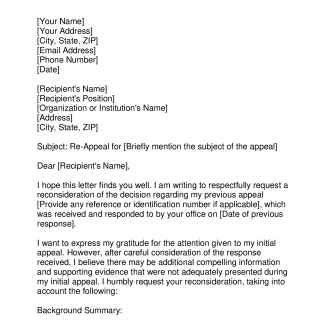Re-appeal Letter
Re-Appeal Letter: A Powerful Tool for Seeking Resolution
A re-appeal letter serves as a crucial written submission when the desired outcome is not achieved through an initial appeal. It allows individuals to present additional information, new evidence, or stronger arguments to support their request for reconsideration.
The main purpose of a re-appeal letter is to make a renewed appeal after an initial appeal has been unsuccessful. It aims to convince the recipient to reconsider their decision by providing compelling and relevant information that was not previously presented, emphasizing the significance of the matter at hand.
Components and Important Fields:
- Opening: Begin the letter with a polite and professional salutation, addressing the recipient by name if possible.
- Background: Briefly summarize the previous appeal, including any prior response or decision received.
- Additional Information: Present new facts, evidence, or arguments that support the request for reconsideration. Clearly state why this information was not available during the initial appeal.
- Importance Statement: Emphasize the importance and potential implications of the matter, illustrating why it deserves further consideration.
- Conclusion: Conclude the letter by reiterating the request for reconsideration and expressing gratitude for the recipient's attention to the matter. Provide contact information for further communication.
The parties involved in a re-appeal letter are the sender (the individual making the appeal) and the recipient (the decision-maker or authority who will review the appeal).
Data and Document Requirements:
To write an effective re-appeal letter, gather and include the following:
- Previous appeal documentation and the response received.
- New evidence that strengthens your case.
- Any relevant personal or official records to support your arguments.
- Contact information and any supporting documents or references mentioned.
Sample of Re-appeal Letter
[Your Name][Your Address][City, State, ZIP][Email Address][Phone Number][Date][Recipient's Name][Recipient's Position][Organization or Institution's Name][Address][City, State, ZIP]Subject: Re-Appeal for [Briefly mention the subject of the appeal]Dear [Recipient's Name],I hope this letter finds you well. I am writing to respectfully request a reconsideration of the decision regarding my previous appeal [Provide any reference or identification number if applicable], which was received and responded to by your office on [Date of previous response].I want to express my gratitude for the attention given to my initial appeal. However, after careful consideration of the response received, I believe there may be additional compelling information and supporting evidence that were not adequately presented during my initial appeal. I humbly request your reconsideration, taking into account the following:Background Summary:Summarize the facts of the case and the previous response received. Acknowledge the decision made while briefly highlighting the need for a fresh review.New Information:Present the new facts, evidence, or arguments that were not included in the initial appeal. Clearly explain why these were not available earlier and how they strengthen the case. Be concise but provide sufficient details to make your points clear.Importance Statement:Emphasize the significance and potential consequences of the matter at hand. Explain how a favorable resolution is not only important to me personally but also to the larger context or any relevant stakeholders involved.Conclusion and Request:Conclude the letter by respectfully and politely reiterating your request for reconsideration, considering the new information provided. Express your genuine belief that the inclusion of these factors may lead to a more equitable and favorable decision. Provide your contact information if the recipient requires any further clarification or supporting documentation.Thank you for taking the time to review my re-appeal. I sincerely hope that you will give thorough consideration to the additional information and evidence provided. Your fairness and impartiality in assessing my case are greatly appreciated.I look forward to a favorable response and the opportunity to discuss this matter further, if needed. Thank you for your attention to my request.Sincerely,[Your Name]
Application Examples and Use Cases:
- Educational Appeals: Students can use a re-appeal letter to challenge a denied admission or scholarship decision, providing additional information such as improved grades, achievements, or extenuating circumstances.
- Insurance Claims: Policyholders may submit a re-appeal letter to contest a denied insurance claim, attaching additional medical records, expert opinions, or legal references.
- Legal Proceedings: A re-appeal letter can be utilized in legal cases to request a reconsideration of a court's decision, presenting new evidence or highlighting errors made.
Strengths:
- Provides a formal platform to present new information and arguments.
- Demonstrates perseverance and commitment to seeking resolution.
Weaknesses:
- Success is not guaranteed, as it depends on the recipient's willingness to reconsider the decision.
- Requires careful crafting to ensure that the letter is persuasive and compelling.
Opportunities:
- Offers a chance to rectify any misunderstandings or overlooked information from the initial appeal.
- Allows individuals to present a stronger case and potentially achieve a favorable outcome.
The recipient may maintain their original decision despite the re-appeal. Inadequate or irrelevant information presented in the letter may weaken the appeal further.
Different from a re-appeal letter, an appeal letter is the initial response requesting a reconsideration of a decision. A standardized form used to document complaints or grievances in various organizations or institutions.
The outcome of a re-appeal letter can significantly impact the future of the individuals involved. It has the potential to reverse unfavorable decisions, facilitate opportunities, or bring resolution to complex situations.
A re-appeal letter should be submitted directly to the appropriate recipient, following any specific guidelines provided by the organization or authority. Always retain a copy of the letter for personal records, and consider sending it via certified mail to ensure proof of delivery.
A well-crafted re-appeal letter serves as a powerful tool for individuals seeking resolution. By providing new information, emphasizing importance, and expressing a genuine desire for reconsideration, one can increase the chances of obtaining a favorable outcome. However, success depends on the recipient's receptiveness and the strength of the arguments presented.

